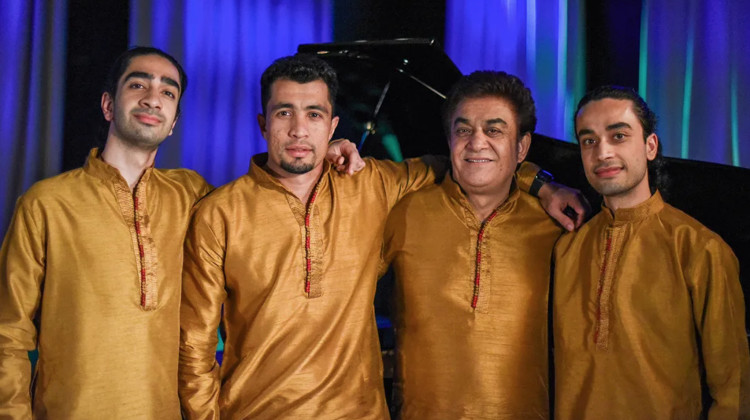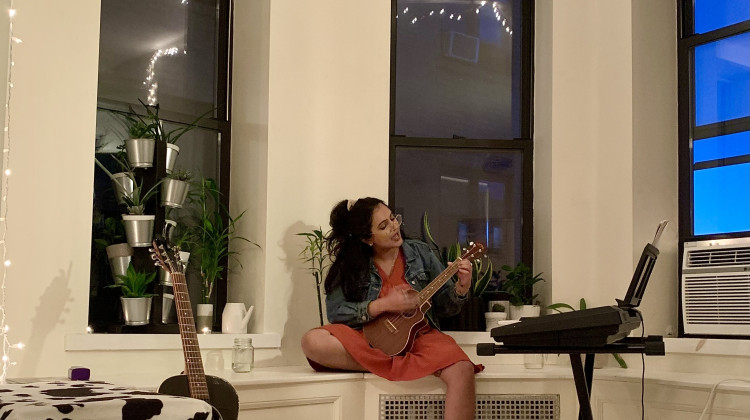
The Fanoos Ensemble will be performing in Central Indiana later this month. From left to right: Mehran Fanoos, Sohail Karimi, Ahmad Fanoos and Elham Fanoos.
Photo courtesy of Elham FanoosPianist Elham Fanoos was born in Afghanistan in 1997. During that time, music was banned under Taliban rule. But Elham’s father, Ahmad Fanoos, nurtured his son’s musical talent.
Today, they perform together as the Fanoos Ensemble — a unique family group, that blends traditional Afghan music with Western classical instrumentation.
The Fanoos Ensemble will be performing in Central Indiana later this month. WFYI’s Kyle Long recently spoke with Elham Fanoos.
This interview has been edited for length, style and clarity.
Kyle Long: Thank you for taking time to join me today.
Elham Fanoos: Of course, it's my pleasure to be here. Thanks for having me.
Long: I understand the piano was not your first instrument. You started out playing the tabla. Is that right? Tell us a bit about your background as a musician.
Fanoos: That's correct, I used to play tabla when I was five years old, and then when I was around the age of 11, I looked on YouTube. I went on YouTube, and, you know, I searched piano, and I came across this legendary pianist, Vladimir Horowitz, who's one of my favorites, my idols. I just saw the instrument, and fell in love with it. I just thought it was so prestigious. The instrument had a certain class and sound. You know, for me, the piano can do everything, chords, melody, harmony, rhythm, it can do it all.
Long: The Fanoos ensemble is a family group. Your brother plays violin. Your father, Ahmad Fanoos, is the vocalist, and in many ways, he's the star of the group. Tell us a bit about your father and his reputation as a singer back home in Afghanistan.
Fanoos: So my father is and was quite well known in Afghanistan, because he served as a judge on Afghan Star, which is similar to American Idol. That was like the most watched TV show. He was already quite well known because he was also doing a lot of concerts all over Afghanistan, even in cities like Herat. It was actually to the point sometimes, when we were driving, sometimes at a traffic light, we would stop, and then, you know, people would look at us, and then they're like, “Oh, this is Ahmed Fanoos from the TV show.” He was quite well known, and he's very well respected among Afghan musicians as well.
Long: Am I correct that you perform a song that he made famous in a film, the song “Zindagi”?
Fanoos: Yes, that's correct. You have done your research. Yes, that was part of a movie. That's how he became very famous. It was almost like a hit, not almost, it was a hit song. A lot of people actually can sing along with him.
Long: On a more difficult subject, Elham, there's been a lot of conflict in Afghanistan over the last few decades. At times, music was outlawed in the country during Taliban rule. Can you talk about the importance and difficulty of preserving Afghan music and culture?
Fanoos: Music is currently outlawed and banned in Afghanistan, just like from 1996 to 2001 when the Taliban first took over. It's extremely hard to imagine that there's a world without music, without sound, and that makes you almost so disappointed that you basically have to get up and do something about this, because you can use your voice and your skills as a musician.
That's that was initially one the main reasons I studied music professionally, because I wanted to show a positive face of Afghanistan, a new face of Afghanistan that maybe many people in the West have not seen before. Preserving Afghan music is really a duty, almost now, not just a passion, or not just, you know, because we love music so much. I feel responsible to preserving Afghan music, because otherwise the culture will be gone.
This interview originally aired on WFYI's Cultural Manifesto.
 DONATE
DONATE







 Support WFYI. We can't do it without you.
Support WFYI. We can't do it without you.